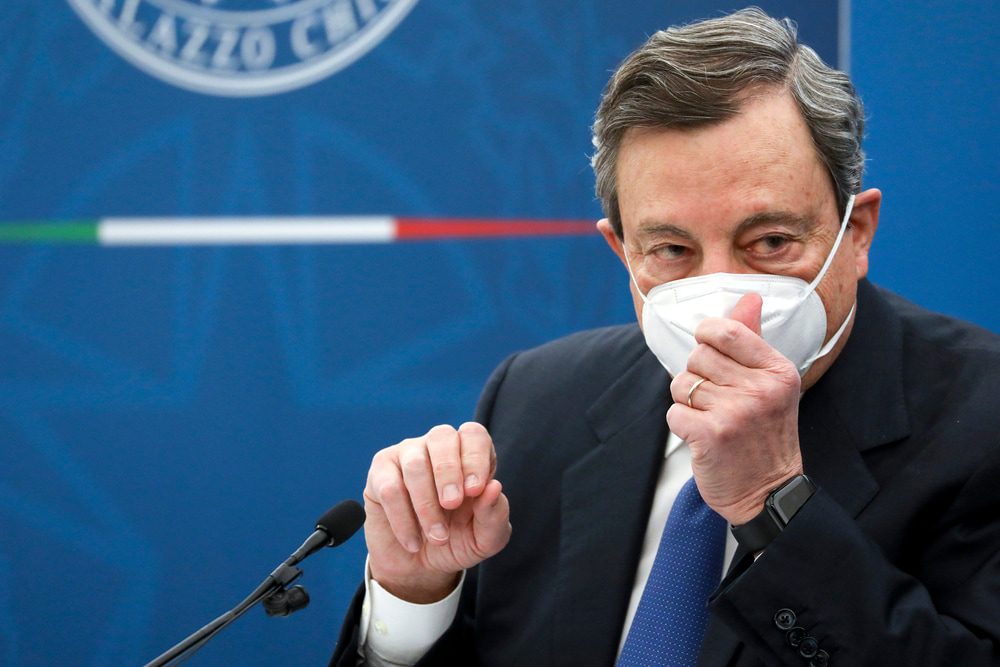
On February 15th, Italy introduced a new COVID mandate, the so-called “Super Green Pass,” for adults over the age of 50. From this moment forward, all residents over the age of 50, including foreign nationals and freelance workers have to be either thrice vaccinated, or twice vaccinated and recovered, to be able to enter their workplaces. Failure to comply results in suspension from work and the freezing of salaries.
The Super Green Pass rules are scheduled to be in place at least until June 15th, but may be extended beyond that. Deputy Health Minister Andrea Costa clarified that “we must try in every way to reduce the number of unvaccinated people,” claiming also that “those who mainly occupy intensive care units are unvaccinated.” For Costa, “we must give hospitals the opportunity to continue with ordinary activities.”
Italy has a high vaccination rate of more than 88% over the age 12, but Prime Minister Draghi has still been very critical of the remaining unvaccinated part of the population. In January he accused the unvaccinated of being responsible for “most of the problems” Italy faced in combating COVID-19.
Prior to the Super Green Pass, the Green Pass had been in place since October 15th of 2021. While the basic Green Pass allowed for the possibility of a negative COVID test, that option is now taken away by the Super Green Pass.
Since Tuesday, the barring of unvaccinated employees over the age of 50 from entering their workplaces has resulted in an “unjustified absence.” Consequently, after five days, employees will be suspended and their pay frozen. On top of that, fines ranging from €600 to €1500 will be issued to those trying to enter their workplaces without the Super Green Pass. Fines for employers who ignore the pass requirement range between €400 and €1000.
After a movement earlier this month, in which citizens boycotted restaurants asking for health passports and assembled in the streets of major cities to consume their own food, demonstrations against the restrictions have now sprung up in some Italian cities. Critics of the new mandate include Emanuele Dessi, a former member of the Five Star Movement that has since switched sides to represent the Communist Party. “I believe in science, in medicine, in vaccines,” Dessi said, “yet I am against the obligation of a green pass which could keep one and a half million Italians away from work.” He added that in his perception the measure “makes no sense at this stage of the pandemic.”
Mario Michele Giarrusso, the Senator from Catania representing the Italexit party, went even further in his criticism, stressing that obliging members to present a Super Green Pass (SGP) to enter Parliament deserves the same resistance as “opposing a fascist norm.” He elucidated this analogy with another, as he described how the SGP sets a precedent that could lead the “majority to approve a law that prevents entry to the Senate to all who are not over one meter and eighty tall, who are not blond, and don’t have blue eyes.”
The enforcement of the SGP coincides with a parallel relaxation of the rules of the normal Green Pass. Those rules are scheduled to be removed by March 31st, which matches similar plans in other European countries in which the gradual relaxation of COVID restrictions goes hand in hand with mandatory vaccinations.
Matteo Bassetti, director of the Infectious Diseases Clinic of the San Martino Polyclinic in Genoa, stated that “the green pass has exhausted its task as a tool for vaccinating Italians.” For him, keeping the Green Pass beyond March 31st would “not lead to more immunization,” from which he follows that extending it beyond March 31st would “only be a political decision and not a medical one.”
